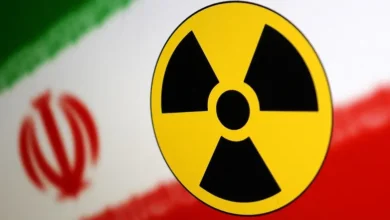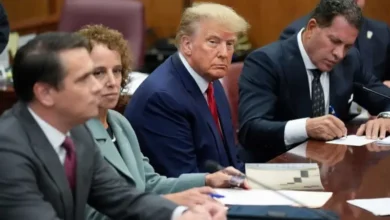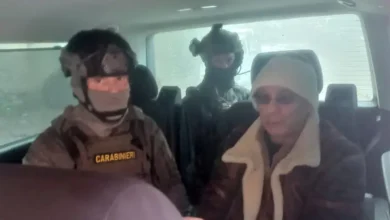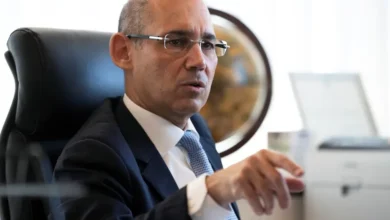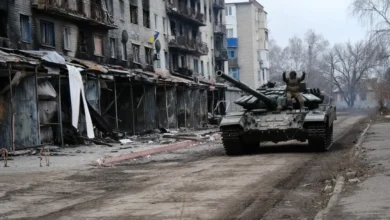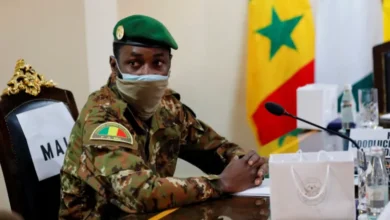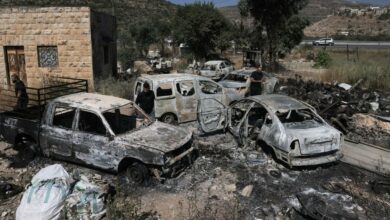Muslims in fear in India’s Gurugram after attacks on mosque, businesses

The Anjuman Jama mosque in Gurugram’s Sector 57 is deserted. About 10 police officers stand in front of the concrete structure, which used to host up to 450 worshippers but is now a mound of debris and ashes.
The mosque – one of the few places for Muslim worship in Gurugram, a predominantly Hindu city next to India’s capital, New Delhi – came under attack on the night of July 31, allegedly by a Hindu far-right mob.The assailants set the mosque ablaze and killed Mohammad Saad, a 22-year-old naib (deputy) imam who was inside at the time. The attack took place hours after deadly communal violence erupted in the neighbouring Nuh district in Haryana state.
Mohammad Faheem Kazmi, an interior designer who regularly prays at the torched mosque, said he was horrified.
“This attack was revenge for Nuh,” the 32-year-old, who has lived in the area since 2011, told Al Jazeera.
At least four people were killed, including two policemen, when a Hindu religious procession in Nuh that was organised by the Vishwa Hindu Parishad (VHP) and Bajrang Dal, two Hindu far-right organisations aligned with the ruling Bharatiya Janata Party (BJP), turned violent.According to media reports and Nuh residents, clashes ensued after some Muslim men stopped the religious procession and stones were thrown at the march.
Authorities in Haryana have deployed additional troops, imposed a curfew and suspended the internet in the wake of the unrest. But the measures did not stop Hindu mobs from attacking Muslim-owned shops, roadside eateries, properties and places of worship in Gurugram as well as in nearby towns such as Sohna, residents said.
Shops in Gurugram’s Sector 70A and Sector 66 were torched on Tuesday evening, while Bajrang Dal members held a rally in Haryana’s Bahadurgarh city, shouting hateful slogans such as “Desh ke gaddaron ko, Goli maaro saalon ko” (“Shoot the traitors of our country”) – a chant that was widely used by BJP politicians against Muslims during the anti-Citizenship Amendment Act protests in 2019 and 2020.
Speaking about the violence on Tuesday, Gurugram Police Commissioner Kala Ramachandran told Al Jazeera that “some kiosks were damaged in arson”.
“Prima facie [On the first impression] the men we rounded up were not linked to any particular group. However, an investigation is still under way,” she said.
The offices of companies such as Google and Deloitte are located just a few kilometres from the sites of violence in Gurugram, which has been given the moniker “millennium city” for attracting multinational corporations and hosting upmarket shopping centres.
The unrest in Haryana comes a month before global leaders are due to arrive in New Delhi for a Group of 20 (G20) summit. Prime Minister Narendra Modi has not commented on the violence that came a day after a railway security officer killed one of his colleagues and three Muslim passengers, in what is seen by many as a hate crime.In recent weeks, Modi has also been criticised for staying silent on the weeks-long ethnic violence that has erupted in the northeastern state of Manipur, killing more than 130 people and forcing thousands to live in relief camps.
Haryana state Chief Minister Manohar Lal Khattar on Wednesday said a total of 116 people had been arrested in connection to the violence there.
“The conspirators [behind the clashes in Nuh] are being continuously identified,” he told reporters.
Khattar, who is from Modi’s BJP, did not comment on the imam’s killing. “Those found guilty will not be spared. We are committed to the safety of the public,” he said.In 2020, police in New Delhi were accused of either doing little about or at times complying with violence that left 53 people dead, mostly Muslims.
Anwar said he had spoken to his brother half an hour before his killing. “He called me at 11:30pm saying the police were at the mosque and that there is nothing to be worried about,” he told Al Jazeera.
At about 2:30am, Anwar said he learned of the killing. “This happened in the presence of police,” he alleged, as he waited outside the mortuary to collect the body.Gurugram Police Commissioner Ramachandran told Al Jazeera the attack was carried out by an “armed mob”.
“Security has been strengthened around mosques,” she said. “We have met members of both communities and asked for restraint and cooperation.”
In recent years, members of Hindu far-right organisations have been protesting against Muslims offering Friday prayers in public spaces in Gurugram. Authorities have cancelled permits for most of the prayer sites, with the Anjuman Jama mosque being one of the few remaining places of worship left in the city.
About a month before he was killed, Saad had posted on social media: “Oh Allah, please make Hindustan [India] a place where Hindus and Muslims eat from the same plate.”
How the violence unfolded in Sohna
In Sohna town, nearly 30km (18.6 miles) south of the Anjuman Jama mosque, a stretch of shops belonging to Muslims in the town’s main road lay charred following the violence there on July 31.Nearby, windows of homes were broken, vehicles burned and the streets littered with stones and bricks.
“The mob saw the names on the hoardings outside the shops and burned only those belonging to Muslims,” claimed Azad Khan, 47, a resident whose home was also pelted with stones.
Residents said a Hindu right-wing mob armed with pistols and rods had gathered in the area, which is home to some 200-250 Muslim families, at about 3:30pm that day.
“They were shouting ‘Jai Shri Ram’ [Hail Lord Ram] and saying ‘Jab mulle kaatey jayenge, Ram Ram chillayenge [Muslims will be slaughtered in the name of Ram],” Khan told Al Jazeera.
Jai Shri Ram has emerged as a war cry by Hindu far-right groups, who have been accused of lynching dozens of Muslims on the suspicion of cow smuggling since Modi came to power in 2014.
“I have five sons, all of whom used to sell fruits on carts across the street. The mob burned their carts and stole mangoes they had just brought to sell,” said resident Hamidan Begum, 60, adding that the financial damage was worth hundreds of dollars.
In the heart of Sohna town, the Shahi Jama mosque was also attacked.
Shamim Ahmed, 48, the mosque’s caretaker, said a crowd of 50-60 people came in with their faces covered, iron rods and firearms in their hands.
“I took the children into the room and locked it from the inside. I turned off the light and just kept holding the door,” he said.
The prayer hall of the mosque was vandalised and the window panes were broken while copies of the Quran were thrown on the floor.

